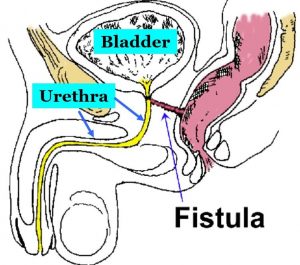What is a urologic bowel fistula?
A urologic bowel fistula is a condition best described as a tunnel which communicates between the urinary system and the large bowel (colon or rectum). Urologic bowel fistula occurs in both genders. In men, the fistula can communicate between the bladder or the urethra (the tube that drains the urine through the penis) and the rectum or colon [Figure 1]. In women it usually communicates between the bladder and the sigmoid colon, especially in women who had a prior hysterectomy (the uterus removed).

Figure 1 – A urologic bowel fistula in a man
What causes a urologic bowel fistula?
Various conditions can cause a urologic bowel fistula. Some conditions occur only in men and some in both genders. Such conditions include:
- Cancer
- Crohn’s disease
- Diverticulitis
- Prior anal, rectal, or vaginal surgery
- Prostate cancer treatment [Figure 2]
- Radiation therapy
- Trauma
- Tuberculosis or other atypical infections

Figure 2 – A man with a fistula between the urethra and the rectum after radiation seeds implants for prostate cancer
What are the symptoms of urologic bowel fistula?
Patients with urologic bowel fistula have 1 or more of the following symptoms:
- Bladder urine infection
- Fever and blood stream infection
- Gas or stool particles in the urine
- Urine leakage from the rectum and/or vagina
- Pelvic abscess
- Pelvic pain
- Rectal bleeding
How is a urologic bowel fistula diagnosed?
The history and physical examination are often sufficient to raise suspicion of the diagnosis. An office-based examination includes an inspection of the abdomen, a finger examination of the anus, and Anoscopy or Proctoscopy to look inside the anus and the rectum. Dr. Maher Abbas personalizes the care of every patient. One or more of the following tests are typically recommended to complete the evaluation:
-
Endoscopic examination: Colonoscopy to assess the large bowel (colon and rectum). Colonoscopy is a very important test especially if the patient has any abdominal symptoms, rectal bleeding, or fistula features suggestive of the possibility of inflammatory bowel disease such as Crohn’s disease. Vaginoscopy is an examination where the inside of the vagina is inspected using special instrumentation to document the presence and location of a bladder fistula that drains into the vagina. Cystoscopy is an endoscopic examination of the bladder lining
-
Imaging studies: a computed tomography scan (CT) or magnetic resonance scan (MRI) is ordered to determine the presence and location of the fistula or any associated pelvic abscess. Gastrografin enema is a fluoroscopy study during which contrast material is injected through the rectum and serial pictures are obtained to evaluate the fistula. Similarly, a cystogram is a fluoroscopy study which involves injecting contrast into the bladder
How is a urologic bowel fistula treated?
Surgical intervention is the only treatment modality for patients with urologic bowel fistula. The type of surgical operation depends on the gender of the patient, the location, and the cause of the fistula. Some patients require abdominal surgery with bowel resection while others can be repaired locally from the bottom side of the pelvis. A variety of techniques are available including the use of muscle flaps. Some patients require a stoma (Ileostomy or Colostomy) to protect the repair. Often the stoma is temporary and usually gets closed several months after the repair.
What happens if a fistula is left untreated?
Urologic bowel fistula should be repaired surgically. In addition to negatively impacting the patient’s quality of life, an untreated fistula is dangerous and can lead to recurrent urine infection with the risk of a blood stream infection.
Why seek the care of Dr. Maher Abbas?
Dr. Maher Abbas is an American Board Certified Colon and Rectal Surgeon with special interest in complex pelvic and colorectal fistulas. He provides the entire spectrum of operations for urologic bowel fistulas. These complicated fistulas can be very challenging to treat and require significant surgical expertise.

If you would like to schedule a consultation with Dr. Maher Abbas to discuss and evaluate your condition, click here. If you have previously undergone any operation or tests related to your condition, kindly bring all outside reports for Dr. Maher Abbas to review the day of your consultation.




